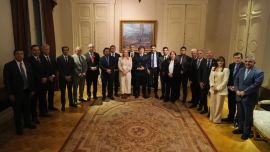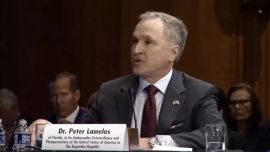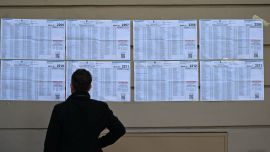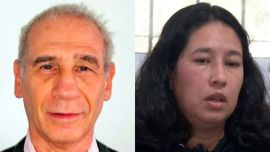A visiting United Nations expert has called on Argentina to ensure that its international debt obligations do not compromise human rights.
“Argentina must maximise its resources to uphold human rights and prevent regression,” said Attiya Waris, UN Independent Expert on foreign debt, international financial obligations and human rights, at the conclusion of a 10-day visit that included stops in Buenos Aires City and the provinces of Buenos Aires and Jujuy.
Sharing the preliminary findings from her visit, Waris highlighted the importance of re-establishing confidence in national institutions.
“The state must lead by aligning public policy towards the realisation of human rights for its tapestry of diverse people,” she said in a press conference at the University of Buenos Aires Faculty of Law, adding that: “Argentina is rich in all types of resources, both human and natural, and if well directed should take the state a long way in realising its human rights obligations through pluralism and inclusion.”
The UN expert acknowledged that, despite significant social and economic advancements, key challenges remain. The burden of public debt that Argentina had accrued over the years, while necessary for economic stability, has not resulted in corresponding human rights investments or the rebuilding of livelihoods, Waris warned.
“The surcharges that Argentina has been required to pay in relation to public international debt have more than doubled the cost of the agreements, thus depleting the country’s resources that could be used to support public policy and programmes aimed at protecting and promoting human rights,” she said.
In August, Argentina’s debt was estimated at seven trillion pesos by the Central Bank, with private consultants approximating monthly interest payments at over 400 billion pesos. Such suffocating interest payments are, Waris points out, a major obstacle in funding the sort of social programs necessary to lift the poorest Argentines out of poverty.
The INDEC national statistics bureau reported this month that poverty reached 36.5 percent of the population in the first half of the year, with 8.8 percent living in extreme poverty.
“With very high poverty levels in the country, lack of adequate communication across all parts of the country and declining living standards, the use of maximum available resources is called into question,” added Waris. “The situation is deteriorating daily due to soaring inflation, launching large projects, multiple exchange rate practices and a regressive tax system, largely reliant on VAT, that particularly affects people living under the poverty line, among them indigenous communities”.
Behind China, Argentina possesses the second-largest volume of shale gas in the world, much of which is deposited in the Patagonian Vaca Muerta formation. While the extraction of this asset has infused billions of dollars into Argentina’s economy, it has also drawn the vociferous opposition of environmentalists and indigenous activists, groups who are particularly opposed to the controversial fracking process required for utilizing shale.
One of the most critical hurdles between Argentina and economic stability is the successful reduction of energy subsidies, as per the loan agreement conditions negotiated with the IMF. In 2021 alone, the government spent nearly US$11 billion to shelter citizens from market energy rates. And while the government has expressly stated that subsidy reductions will be implemented in a progressive manner that shields the lowest-earning Argentines, Waris raised concerns about the well-being of those who lack access to basic utilities altogether.
“Beyond the issue of energy subsidies, I think the government needs to spend more money developing infrastructure in order to allow Argentines who live outside developed spaces to access energy. There are parts of this country that have no access to any kind of infrastructure,” Waris pointed out, speaking directly to the Times.
Additionally, the investigator indicated that budget cuts for education and housing programmes were consistent and concerning, and that there is no formal support structure for indigenous communities.
Waris, a University of Nairobi law professor, lauded efforts by the Argentinian authorities to achieve greater gender parity, but expressed concern about women’s participation in the labour force, particularly in the judiciary. Currently, all four of Argentina’s supreme court justices are men following the resignation of Elena Highton de Nolasco in October 2021. She has yet to be replaced.
Waris lamented the lack of accountability regarding the country’s history with public foreign debt, reinforcing the need for public oversight. “All branches of the State should play a part in holding those responsible for taking on unsustainable debt to account and seeking repatriation of state assets. Projects launched to generate revenue and repay the debt must have the informed and participatory consent of the people,” she observed.
Moreover, Waris acknowledged Argentina’s lack of a truth-seeking mechanism to perform transparent, publicly accessible investigations on the country’s debt history. “Argentina’s debt problem dates back to the times of dictatorship, cutting across several different administrations. Yet despite efforts by the State to provide redress and reparation to victims of human rights violations committed during the dictatorship, it is surprising that a similar truth-seeking process has not been established to deal with the country’s history of debt,” Waris said.
One of the most persistent barriers to attracting foreign investment in Argentina and buttressing the peso is the nation’s lingering reputation for political volatility and turmoil. Waris told the Times that although the recent assassination attempt on Cristina Fernández de Kirchner was deeply troubling, it did not undermine her conviction in the nation’s vast potential for growth and prosperity.
“It was very troubling for the country,” Waris told the Times. “But from what I’ve seen on the streets and on posters, Argentines have a lot to be proud of. I feel like the event has unified the country, and I would tell members of the international community that I have confidence in Argentina’s stability. This is an economy that is ready to leap forward with a people who are completely capable.”
The investigator will present a finalised version of her findings and recommendations to the UN Human Rights Council in March 2023, a report that is expected to maintain a similar focus on the issues of poverty, economic inequality and social welfare.



















Comments